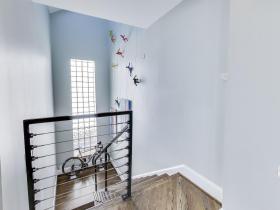What's Hot: A First Look At Friendship Commons, The Big Plans To Redevelop Former GEICO Headquarters
 Logan Micro-Unit Project Delayed Again by Divided BZA
Logan Micro-Unit Project Delayed Again by Divided BZA
✉️ Want to forward this article? Click here.
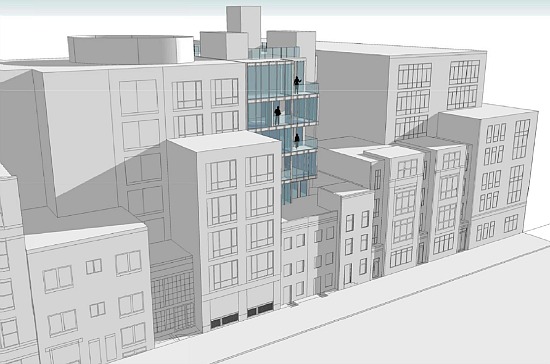
An earlier rendering of the development, facing Church Street NW. Peter Fillat.
Brook Rose and Gregg Busch have spent the better part of a year arguing they should be allowed to build a 37-apartment micro-unit building on the property at 1456-1460 Church Street NW (map), which is fronted by three historic buildings they plan to preserve.
Preserving those buildings means they can’t dig under them to build parking, and they’ve presented evidence suggesting building parking on the site is not only impractical, but impossible. That’s why they’ve decided to build micro-units targeting a carless crowd. Their plan has received support from DDOT, ANC 2F, the Historic Preservation Review Board and the Office of Planning. But it has stalled in front of the Board of Zoning and Adjustment (BZA) because after months of delay, board members were unable to reach a quorum to decide on the building’s parking issues earlier this spring.
Opposition to the project has been most vigorously voiced by Paul Mesterhazy, a resident of the adjacent Metropole building whose unit is “right behind the development,” as he testified in front of the BZA on Tuesday. Mesterhazy’s partner, Jeff Hinkle, is a member of the BZA, but has recused himself from the decision. In a meeting about the case earlier this spring, the board was divided on the parking issue, at 2-2, with Chair Lloyd Jordan dissenting, before it decided to appoint a temporary replacement for Hinkle to help decide the case. That led to Tuesday’s meeting, where Busch and Rose made an extensive case on the parking issue specifically. They were opposed by an attorney for the Metropole and three Metropole residents whose condos face the property.
A transportation specialist hired by the developer said Tuesday that without any mitigation, the project would contribute about a 1 percent increase in traffic to the area. With mitigation, they believe there will be no increase to the area’s traffic.
Parking concerns are paramount in the District, which has a confusing policy for awarding Residential Parking Permits (RPPs). DDOT has said its policies regarding RPPs are under review. But the BZA has previously granted parking exceptions to similar projects in very dense neighborhoods, including a 56-unit Madison Investments building at 14th and Wallach Place near U Street that was awarded a special exception to build the project without any parking in October 2013.
The BZA requests for the building at 14th and Wallach Place were decided that same month. In another case, decided in February, Lock 7 development pledged to prohibit RPPs, proposed installing a screen in the lobby that would help residents reach public transportation, as well as give the first residents of a building $100 rebates toward a car or bike share. In the decision meeting, Jordan asked them to extend the $100 car or bike share rebates to all new tenants. Hinkle said he had concerns about the parking exception, but that those were mitigated by the property’s accessibility to public transportation. The exception passed with a 4-0 vote; one seat on the board was vacant.
In comparison, Busch and Rose have pledged to include two Zipcar spaces at their development, lease two spaces in a nearby garage that are available to be reserved by residents’ guests, pay for car share and Bikeshare subscriptions for all residents for the duration of their leases and provide two extra parking spaces for resident use in the back of the building. Though DDOT is widely believed to be working on a plan that will help developers enforce RPP restrictions, Busch and Rose have said that until then, they will submit Freedom of Information Act requests to ensure their tenants are in compliance with lease restrictions prohibiting them from getting an RPP.
On Tuesday, the developers presented evidence that showed a similarly-sized building with 18 units instead of the 37 proposed would not make enough money to secure financing. Jordan decided to delay a decision on the development on Tuesday, citing a need for the Metropole’s opposition to have time to respond to that evidence.
The project has clearly led to differences of opinion among the board with Hinkle’s recusal. Jordan has dissented most vocally. Conversely, board member Peter May has argued that the developers’ plan would actually reduce vehicle density in the neighborhood. A building with fewer units and no RPP limitations would add to the area’s traffic and parking problems, he stated in a previous meeting. On Tuesday he said he had a “very strong” opinion on the project and wanted to ensure he would be available at the vote next month. May’s turnaround is especially interested since he previously voiced pointed disagreement over aspects of the project’s design relating to the roof structure, and relented once the developers changed their design to more fully comply, in May’s opinion, with the spirit of the Height Act.
See other articles related to: logan circle, micro units, micro-units, parking
This article originally published at https://dc.urbanturf.com/articles/blog/despite_efforts_logan_micro-unit_building_delayed_again_by_bza/8512.
Most Popular... This Week • Last 30 Days • Ever
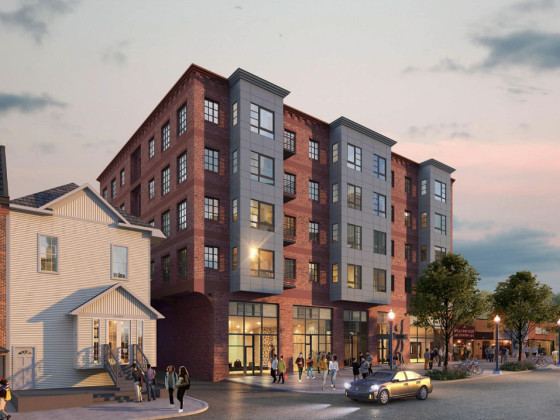
The plan to replace the longtime home of Dance Loft on 14th Street with a mixed-use ... read »

Today, UrbanTurf is taking a look at the tax benefits associated with buying a home t... read »

On Thursday night, developer EYA outlined its plans at a community meeting for the 26... read »
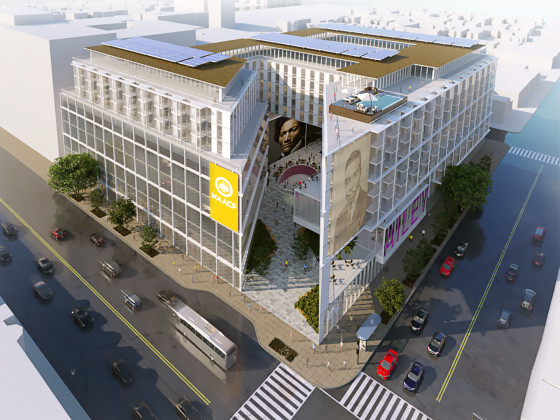
Only a few large developments are still in the works along 14th Street, a corridor th... read »
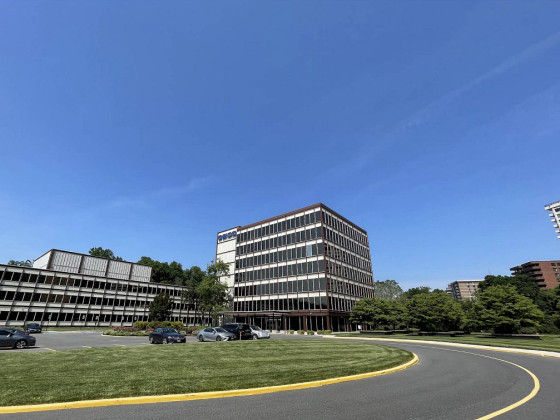
EYA and JM Zell Partners have plans for 184 townhomes and 336 apartments spread acros... read »
- Plans For 101 Apartments, New Dance Loft On 14th Street To Be Delayed
- A Look At The Tax Benefits of Buying a Home Through a Trust
- A First Look At Friendship Commons, The Big Plans To Redevelop Former GEICO Headquarters
- Church Street, U Street + Reeves: A Look At The 14th Street Development Pipeline
- 520 Residences Planned For Former GEICO Campus In Friendship Heights
DC Real Estate Guides
Short guides to navigating the DC-area real estate market
We've collected all our helpful guides for buying, selling and renting in and around Washington, DC in one place. Start browsing below!
First-Timer Primers
Intro guides for first-time home buyers
Unique Spaces
Awesome and unusual real estate from across the DC Metro




